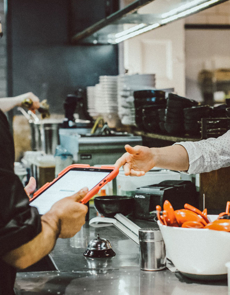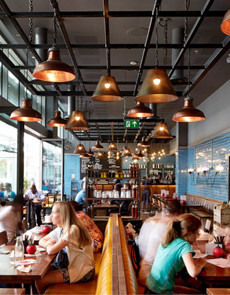How to Improve Sustainability in Hospitality in 2025
Improving sustainability in the hospitality industry doesn’t just help you fulfil your Corporate Social Responsibility and help save the planet. It also helps you ride the wave of changing wants and needs in your customers, who are becoming much more conscious of climate change and pursuing a sustainable lifestyle.
According to Deloitte, around 40% of consumers have been choosing brands that have environmentally sustainable practices and values. For restaurants in particular, it has been found that 75% of customers are willing to pay more for sustainable and eco-friendly menu options.
Here at Access Hospitality, we hear the same message from our hospitality clients, and we help them build tailored solutions that help meet their sustainability goals while also increasing efficiency.
In this article, we’ll discuss some of the key steps you can take to become more sustainable in 2025, and how you can focus on digital sustainability for big wins.

Why improving sustainability is crucial in hospitality
The pandemic triggered a remarkable shift in consumers' preferences. Not only around things like accessibility and home deliveries but also people's perspectives on sustainability have shifted.
Studies find that when it comes to other parts of hospitality, such as hotels, sustainable ways are crucial to 83% of global travellers with 43% saying they feel guilty when they make less sustainable travel choices.
Customers aside, sustainability in hospitality is also incredibly important from a moral standpoint. As mentioned, hospitality contributes to global emissions and wastes a massive amount of food - 920,000 tonnes annually, precisely.
Key sustainability challenges in the hospitality industry:
-
Energy consumption and efficiency,
-
Food waste and inefficient stock management,
-
Water management and conservation,
-
Overuse of single-use plastics and packaging,
-
Carbon footprint and climate change with the pressure to meet 2050 net zero targets,
-
Social responsibility and human rights.
By understanding the emerging and established trends which we will discuss in this article, you can position your business at the forefront of sustainability in 2025.
8 ways to be a more sustainable hospitality operator in 2025
Achieving true sustainability in hospitality requires businesses to go beyond the usual steps in their pursuit of effective and innovative solutions. Improving sustainability in hospitality starts with being strategic, leveraging technology to its fullest extent, and most importantly, putting an authentic desire to be more sustainable at the heart of your operations.
There are numerous avenues that you can take, and the more you can achieve, the better off you will be - both in terms of sustainability and efficiency.
Be more energy efficient
When you’re working in hospitality, you’re likely to be surrounded by appliances that will run throughout the day. Here’s how to reduce your consumption and cut costs:
-
Install an Energy Management System (EMS) - Energy management systems monitor, control and optimise your usage to save both money and energy.
-
Reduce waste and lower costs - By providing insights into your energy usage, an EMS can help you identify areas to cut costs and reduce unnecessary output - whether that be through singling out specific pieces of equipment or highlighting times when energy could be conserved.
-
Remote control and flexibility - Another brilliant feature of an EMS is that it can also allow for direct control over your various appliances. No matter where you are, you can look over your various sites and make the necessary changes.
-
Improve working conditions - Optimising your energy use will also lead to more comfortable environments, meaning more productive staff and more satisfied customers.
-
Switch to energy-efficient alternatives - Alongside this, you should also consider finding energy-efficient alternatives. Effective insulation will cut heating costs dramatically and reduce your operational costs. While multi-function systems, such as a restaurant EPoS remove the need to power multiple systems by replacing them with one singular, adaptable unit.
Explore renewable energy solutions
Another great way to bring down your emissions is to invest in renewable energy.
There are a number of renewable energy technologies available that are perfectly suited for hospitality venues:
- For larger venues with sufficient roof space, solar panels and solar thermal power can be a great return on investment and generate both electricity and heating.
- If you have venues in more rural areas, and a lot of land at your disposal, wind turbines are a slightly costlier, but similarly effective way to generate energy.
- Finally, heat pumps can be a great option for newer builds, drawing on the air, land and water all around you to provide warmth.
In their bid to reach net zero, the the UK government continues to provide significant funding and support to help businesses become greener, with nearly £52 million in funding awarded in January 2025 to 25 businesses across England, Wales and Northern Ireland for innovative emissions-cutting projects.
But that’s not the end of it. Companies invested in sustainability and energy optimisation could even go a step further by becoming a Virtual Power Plant.
If you opt to install smart energy devices, renewable energy sources and energy storage systems in and around your sites, not only will you have your own supply of clean energy (reducing your dependence on the national grid) but you may also be able to support the grid by selling energy back to them, making an extra return on your sustainability efforts.
Conserve water
The UK wastes over 3 billion litres of clean water, which is approximately 25% of the UK’s water consumption, every single day.
There are a multitude of ways to stem your water usage. The first and most obvious way is to only use what you need. The water you use can also be recycled in various ways, such as catching cooking water to reuse in other areas.
Consider how else you use water. Do you have small areas of plants and greenery in or around your venue? Swapping them out for alternatives (such as fake grass) allows you to easily stay on top of the presentation without the need for water use.
For hotel operators, consider putting limits on water usage in individual rooms to help you save water and energy costs by stopping guests from overdoing it, by taking overlong showers, for instance.
Waste less food
For hospitality, food waste is a huge issue. Hospitality outlets collectively waste 920,000 tonnes of food waste every year - that’s the equivalent of 1.3 billion meals. On average, 21% of this is down to spoilage, 45% from food prep and 34% comes back on the customer’s plates.
There are multiple things you can do to combat food waste.
For one, only order what you need, rather than always unnecessarily buying in bulk. Integrating hospitality procurement software could help with this, by creating a more streamlined ordering system. Then, make the most of what food you do have. Leftover ingredients from meals should be funnelled into other meals.
A great place to start would be a review of your current menu. Using menu engineering and costing software lets you part out and adapt menus and recipes to utilise your stock more effectively. Are there any dishes that could be added to make the most of common leftover ingredients? Conversely, are there any items currently on the menu that are unpopular or just too big? These options could be cut or their portion sizes reduced, respectively, to minimise your waste.

Source food and supplies locally
As well as what you do with your food, you should also consider where you get it from. Purchasing food that has to be transported over vast distances unnecessarily contributes to carbon emissions and it also means that it’s not as fresh and therefore will spoil faster.
Offer more varied food options
As well as being more mindful about how you use food, something else you should consider during your menu review is whether or not you’re offering enough plant-based alternatives.
Veganism and vegetarianism are growing, especially among the younger generations. Half of generation Z (50%) and over a third of millennials (36%) plan to follow a meat-free diet in 2025, compared to just 1 in 10 baby boomers (10%).
While many vegans choose their lifestyle for animal-based morality reasons, many are also conscious of the effects that cattle farming has on the planet. The farming of cows and other animals contributes to 49% of all UK methane emissions.
The meat industry also contributes to a range of other problems, such as:
-
Air pollution
-
Excessive water use and pollution
-
Land use and deforestation
-
Overfishing
Consider swapping out some of your less popular meat-based dishes for plant-based alternatives.
Reduce, reuse, recycle
There are a lot of opportunities to recycle in the hospitality industry, beyond reusing water and making use of leftover ingredients. 56% of recyclable packaging and other ‘non-food’ waste is just thrown away. This is a very easy fix and one that would make a huge difference.
Besides being more proactive with your recycling, consider cutting down on unnecessary materials, such as plastics. This can be done in a variety of ways, such as utilising glass containers for leftovers and ingredients, swapping plastic packaging for paper (or forgoing certain packaging entirely) or making changes such as installing soap and shampoo dispensers rather than purchasing individual bottles for each room.
Practice digital sustainability
There are a lot of opportunities to recycle in the hospitality industry, beyond reusing water and making use of leftover ingredients. The hospitality industry is estimated to use over 289,000 tonnes of plastic each year in the UK, despite single-use plastics banned and restricted in 2023.
Cutting down on unnecessary materials, such as plastics, can be done in a variety of ways, such as utilising glass containers for leftovers and ingredients, swapping plastic packaging for paper (or forgoing certain packaging entirely) or making changes such as installing soap and shampoo dispensers rather than purchasing individual bottles for each room.
Next steps to improve sustainability in your hospitality business
In this article, we’ve explored key strategies for improving sustainability in the hospitality industry, ranging from practical examples to digital sustainability tools, all of which help you reduce waste, lower emissions and help attract the increasing number of eco-conscious guests.
Now’s the time to take a close look at your sustainability strategy.
Our friendly specialists are always on hand to talk you through the best software options for a more sustainable business, including:
-
Other paperless, digital and energy-efficient solutions.
Book a personalised demo today and find out what hospitality software can make your business more sustainable

 AU & NZ
AU & NZ
 SG
SG
 MY
MY
 US
US
 IE
IE





